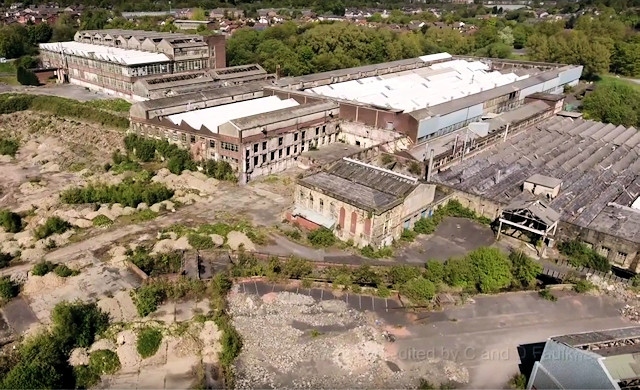‘This crisis could have been prevented’: 100 years since Nellie Kershaw’s death
Date published: 14 March 2024

Nellie Kershaw
Today (14 March) is 100 years since Nellie Kershaw, who worked at an asbestos factory in Rochdale, died from asbestosis.
Nellie Kershaw was born in 1891. She fell ill while working at the Turner & Newall asbestos factory in Rochdale. She died, aged 32-33, on 14 March 1924.
Nellie’s case was the first death from asbestosis to be reported by the medical literature. A former cotton mill worker since she was 12, Nellie transferred to Turner Brothers in 1917, spinning raw asbestos fibres into yarn until 1922, when she became too sick to work. She was issued with a National Health Insurance certificate of ill health, naming her condition as ‘asbestos poisoning.’
As asbestos poisoning was not a recognised occupational disease, Nellie failed to qualify for any benefits. Her employer refused to assist with financial contributions, leaving Nellie to die in poverty.
Turners also refused to accept liability for her illness, paid no compensation to her family and refused to help with funeral expenses.
Following the inquest, Nellie’s death certificate gives her cause of death as ‘fibrosis of the lungs due to the inhalation of mineral particles.’
Three years after Nellie’s death, a more detailed report of her case in the British Medical Journal gave her illness the name recognised today: pulmonary asbestosis.
Asbestos was finally banned in the UK in 1999. People exposed to asbestos dust typically fall ill decades later. Asbestos diseases still kill over 5,000 people in the UK every year.
The dangers of asbestos were known for decades before it was finally banned.
The asbestos industry flourished, despite Nellie’s death. In 1924 Turner & Newall employed 5,000 workers. By 1970 it employed 36,775 around the world. Turner & Newall had major sites in Rochdale, Hindley Green, Trafford Park, and Chapel-en-le-Frith.
From 1957, Turner & Newall worked with Cape and other asbestos manufacturers through the Asbestosis Research Council (ARC). From 1966, the ARC successfully lobbied the UK government against a proposed “no dust policy”, in favour of less stringent regulation.
Had tougher regulation been brought in then, the ban on asbestos could have been achieved much sooner.
Read more: The secret of Spodden ValleyPublished: 17 December 2018
Many buildings built before the 1999 ban still contain asbestos materials. There are concerns that as these materials deteriorate, or are disturbed, that people living and working in those buildings will be put at risk of developing the terminal asbestos-related cancer mesothelioma.
Deaths from mesothelioma will continue for decades to come. There is an ongoing campaign by asbestos victims to get Cape, the former asbestos manufacturer now owned by Altrad, to donate £10 million to mesothelioma research. Turner & Newall no longer exists, and so cannot be asked to donate.

100 year anniversary commemorative events
At 12.30pm on Thursday 14 March, asbestos victims will be gathering at Stevenson Square in Manchester city centre to release doves in memory of all those who have died from asbestos disease.
At 4.30pm on Thursday 14 March, asbestos victims will be laying wreaths at the memorial to asbestos victims at Rochdale Memorial Gardens (OL16 1AG).
Quotes from people affected by asbestos disease:
"I worked as a bookie all my life. Asbestos isn't just a risk to blokes who've worked in heavy industry. If I can get mesothelioma, no-one is really safe. We should be getting asbestos out of public buildings like schools. We should be investing in medical research, because this disease is going to get more people in years to come". Barrie Taylor, mesothelioma patient, 72, Denton.
"I lost my Dad to mesothelioma in 2019. I still think about him every day. No-one should have to lose a loved one like this. If the right lessons had been learnt from what happened to Nellie Kershaw 100 years ago, my Dad might still be here today". Susan Aspinall, Atherton.
"My Dad had mesothelioma. I lost him in 2021. If asbestos companies like Turner Brothers and Cape hadn't hidden the dangers, my Dad might still be here today. The companies responsible should help find new treatments for this terrible disease". Su Phillips, Wigan.
“Nellie’s death was when government should have stepped in with stronger regulation of the growing asbestos industry. Fewer people would have been put in harm’s way if the right lessons had been learnt back then. We should not have had to wait another 70 years for the asbestos ban.” Rob Rayner, co-ordinator of the Greater Manchester Asbestos Victims Support Group.
Founded in 1871 as Turner Brothers, the plant in Rochdale initially manufactured cotton cloth-based packaging. In 1879, the company became the first in the UK to weave asbestos cloth and changed its name to Turner Brothers Asbestos Company.
In 1920, the business was renamed Turner & Newall, after merging with the Washington Chemical Company, Newalls Insulation Company and J.W. Roberts.
Do you have a story for us?
Let us know by emailing news@rochdaleonline.co.uk
All contact will be treated in confidence.
Most Viewed News Stories
- 1Rejection of plan for SEN school being appealed
- 2Appeal after man arrested on suspicion of multiple harassment incidents in Rochdale
- 3Rochdale Sixth Form College hits new high with twelve Oxbridge offers for students
- 4Community event to turn Wardle and Littleborough into 'magical outdoor gallery'
- 5The plan for 445-home estate in Castleton with only one access road
To contact the Rochdale Online news desk, email news@rochdaleonline.co.uk or visit our news submission page.
To get the latest news on your desktop or mobile, follow Rochdale Online on Twitter and Facebook.

